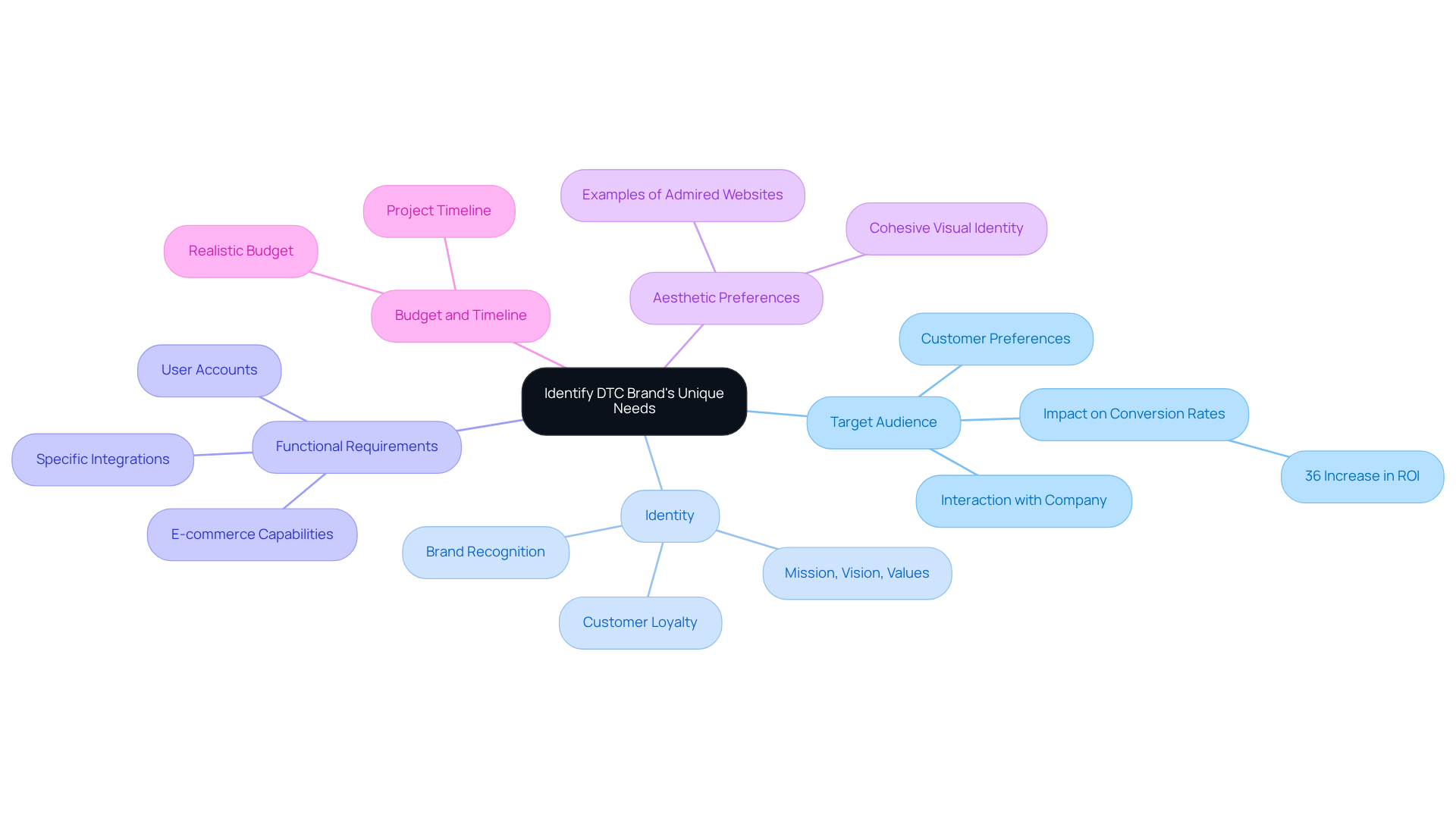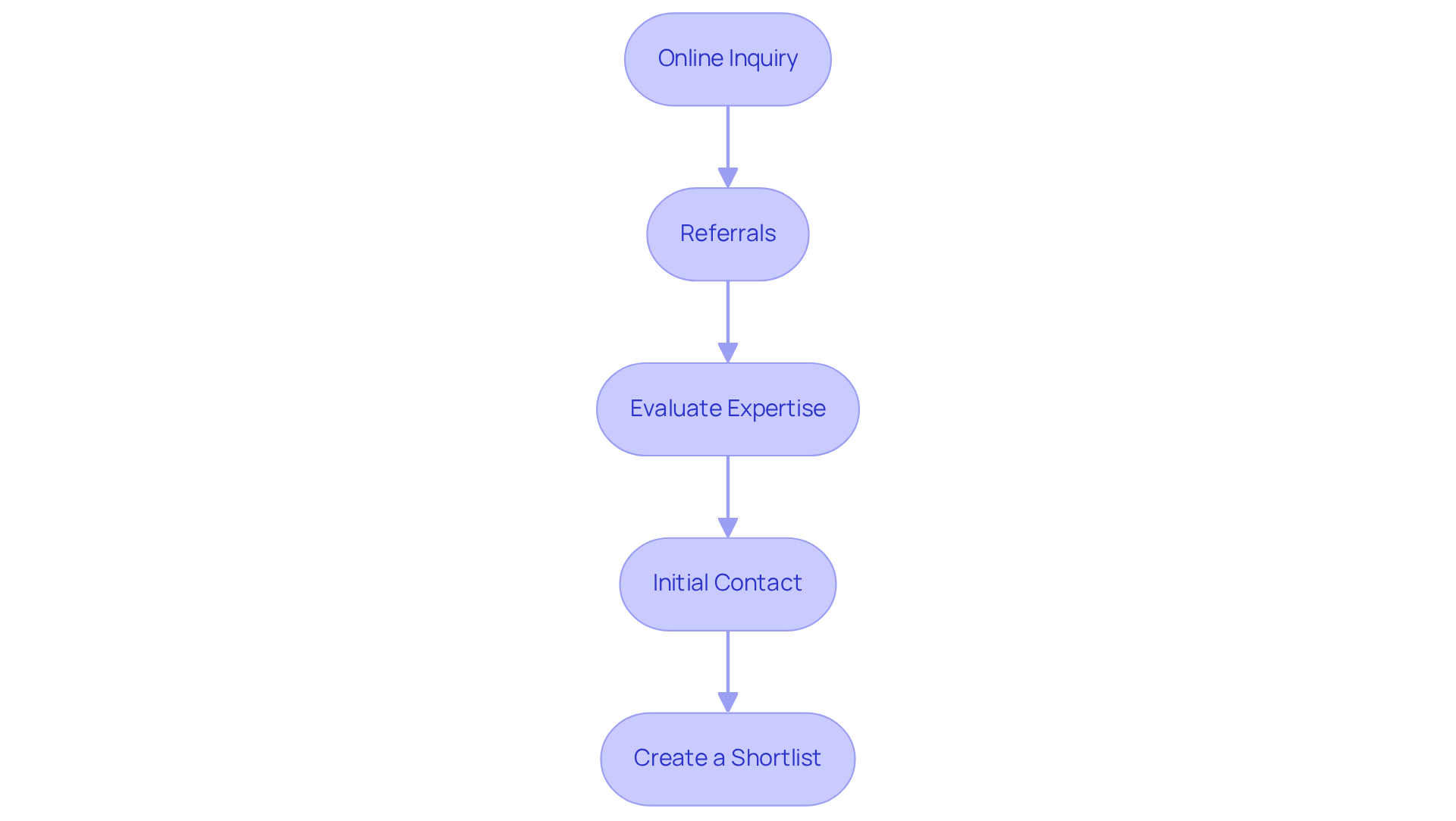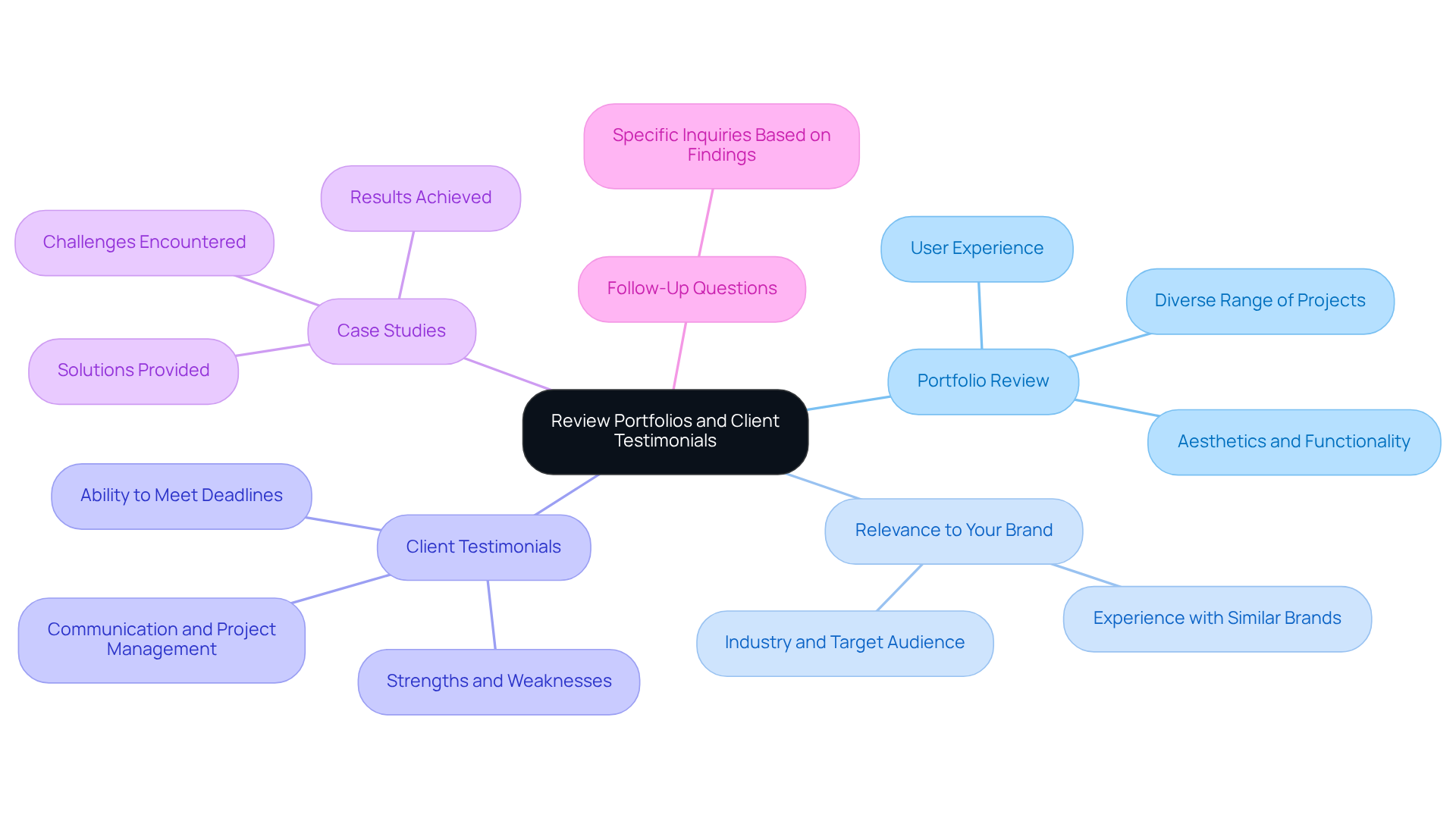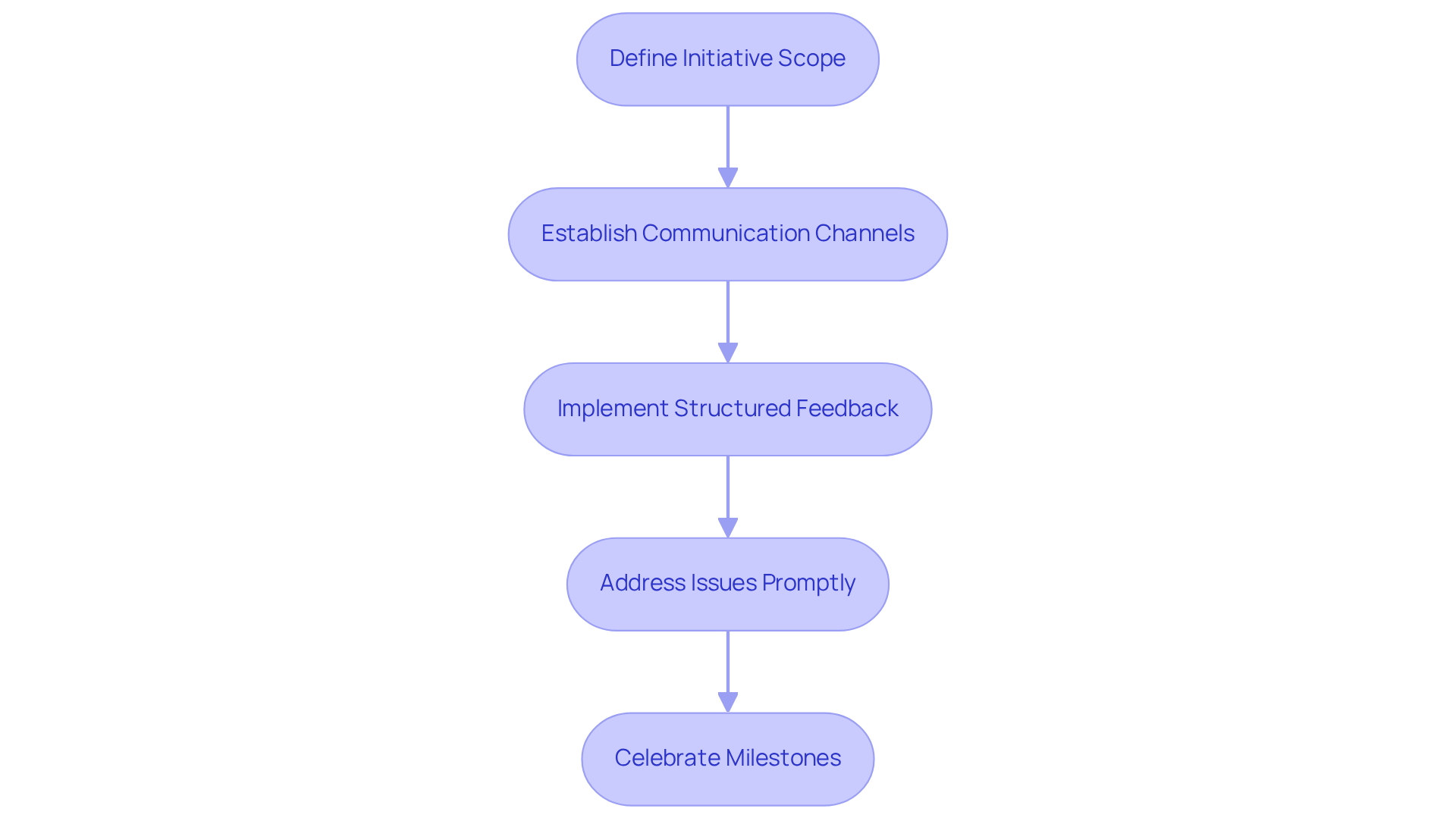
Overview
The article's primary focus is to provide a structured approach for DTC brands to select the right website design firm. It delineates four essential steps:
- Identifying unique brand needs
- Researching and evaluating potential firms
- Reviewing portfolios and testimonials
- Setting clear expectations for effective communication
Each of these steps is critical for ensuring a successful partnership that aligns with the brand's goals and enhances customer engagement.
Introduction
Navigating the competitive landscape of direct-to-consumer (DTC) brands demands not only a unique product but also a compelling online presence. The selection of the right website design firm can profoundly impact a brand's success, as a well-crafted website significantly enhances customer engagement and conversion rates.
With countless options available, the challenge arises: how can brands ensure they partner with a firm that genuinely comprehends their distinct needs and vision?
This guide delineates essential steps for identifying, evaluating, and collaborating with the ideal website design agency, thereby setting the stage for a successful digital transformation.
Identify Your DTC Brand's Unique Needs
Begin by conducting a thorough assessment of your DTC company's unique needs. Consider these critical aspects:
- Target Audience: Clearly define who your customers are, their preferences, and how they interact with your company. Understanding your audience is essential; companies that partner with a website design firm to customize their websites to meet customer expectations can experience significant . For instance, clients of Parah Group have reported a 36% increase in ROI on ads, underscoring the importance of this understanding.
- Identity: Articulate your organization's mission, vision, and values. A clearly defined identity not only guides the agency in developing a website that reflects your essence but also enhances customer loyalty and recognition. As Terence Kawaja, CEO & Founder of AdExchanger, notes, "DTC companies are nearing a turning point where it’s essential to venture beyond the digital channel to sustain the growth that has contributed to their success thus far."
- Functional Requirements: Identify the essential features your website must include, such as e-commerce capabilities, user accounts, or specific integrations. This clarity ensures that the website design firm can deliver a site that meets your operational needs.
- Aesthetic Preferences: Collect examples of websites you admire and highlight elements that resonate with your style. A cohesive visual identity can enhance user experience and reinforce brand recognition.
- Budget and Timeline: Establish a realistic budget and timeline for the project. This approach ensures that prospective companies can align their proposals with your expectations, facilitating a smoother selection process.
By clearly recognizing these needs, you create a robust foundation for the subsequent stages in selecting the right website design firm. The case of Catch Co., which exceeded its sales targets by 200% within one week of opening its experiential store, illustrates the profound impact of understanding customer needs and preferences, further reinforcing the importance of this assessment.

Research and Evaluate Potential Design Firms
Once you have a clear understanding of your needs, it is essential to begin exploring potential website design firms. Follow these steps:
- Online Inquiry: Utilize search engines and social platforms to locate agencies that specialize in DTC products. Seek out a website design firm that has a robust online presence and positive reviews, as these indicators often reflect their credibility and expertise. In a rapidly expanding market projected to reach $296.45 billion by 2025, selecting the right website design firm is crucial for your company's success.
- Referrals: Actively seek recommendations from industry colleagues or other DTC brands that have successfully collaborated with design agencies. Personal referrals can provide valuable insights into the companies' capabilities and reliability.
- Evaluate the expertise of the website design firm by reviewing their website for case studies, client lists, and testimonials. Look for evidence of their experience with DTC brands and their ability to deliver measurable results. For instance, Parah Group has demonstrated significant improvements for clients, including a 36% increase in ROI on ads, highlighting the impact effective design can have.
- Initial Contact: Engage with selected companies to assess their responsiveness and willingness to understand your requirements. This initial interaction can reveal their communication style and professionalism. As Jennely Pershouse noted, navigating the competitive DTC landscape necessitates partners who can adapt and respond effectively.
- Create a Shortlist: Based on your research, compile a shortlist of companies that align with your brand's requirements and values. This targeted approach will aid you in identifying the most creative needs.

Review Portfolios and Client Testimonials
After narrowing down your options, it is essential to meticulously review the portfolios and client testimonials of the shortlisted website design firms.
- Portfolio Review: Seek out a diverse range of projects that effectively showcase the company's design capabilities. Pay close attention to the aesthetics, functionality, and user experience of the websites developed by the website design firm.
- Relevance to Your Brand: Assess whether the company possesses experience collaborating with brands similar to yours in terms of industry, size, and target audience.
- Analyze client testimonials to gain insight into the strengths and weaknesses of the website design firm. Focus on feedback regarding the communication, project management, and ability to meet deadlines of the website design firm.
- Case Studies: If available, examine detailed case studies that outline the challenges encountered, solutions provided, and results achieved. This will offer you a clearer understanding of the company's .
- Follow-Up Questions: Formulate specific inquiries based on your findings to present during the next phase of discussions with the companies.

Set Clear Expectations and Communicate Effectively
Once a design firm is selected, establishing clear expectations and maintaining effective communication is essential for project success. Begin by defining the initiative scope: clearly outline the deliverables, timelines, and milestones. This clarity ensures both parties remain . Next, establish communication channels; choose preferred methods—such as email, management tools, or video calls—and set a regular schedule for updates. Effective communication channels can significantly enhance task efficiency. Implement a structured feedback process to ensure your insights are integrated at various stages of the initiative. This alignment is crucial for the studio to accurately represent your vision. Should issues arise, address them promptly and constructively. Open communication can prevent minor problems from escalating, fostering a more collaborative environment. Finally, celebrate milestones. Recognizing and commemorating project achievements enhances the working relationship and inspires the creative team, boosting morale and commitment.
By following these strategies, you can cultivate a successful collaboration with your creative agency and a website design firm, ultimately resulting in a website that genuinely reflects your DTC brand. Effective communication streamlines the design process and contributes to a more satisfying outcome, as businesses prioritizing customer experience can see sales revenues increase by 2-7%. Furthermore, marketers investing in three or more channels for a campaign experience an almost 500% higher order rate than those using just one platform, underscoring the importance of multi-channel communication.

Conclusion
Choosing the right website design firm for DTC brands is not merely a decision; it is a pivotal choice that can profoundly influence a company's success. Understanding the unique needs of the brand, conducting thorough research, and establishing effective communication are essential to ensure that the selected design partner aligns seamlessly with the company's goals and vision. This comprehensive process not only enhances the website's functionality and aesthetics but also cultivates a collaborative environment that drives tangible results.
The article delineates essential steps, including:
- Identifying specific brand requirements
- Researching potential firms
- Reviewing portfolios
- Setting clear expectations
Each of these stages is crucial, playing a vital role in ensuring that the selected agency can deliver a website that resonates with the target audience and authentically reflects the brand's identity. The significance of effective communication and feedback throughout the project cannot be overstated; it is fundamental for maintaining alignment and achieving the desired outcomes.
Ultimately, the success of a DTC brand's website relies on a meticulous selection process that prioritizes understanding customer needs and fostering a robust partnership with the design firm. By adhering to these guidelines, brands can not only elevate their online presence but also create a platform that drives engagement and growth. Embracing this strategic approach will empower DTC brands to adeptly navigate the competitive landscape and realize their long-term objectives.
Frequently Asked Questions
What are the first steps to identify my DTC brand's unique needs?
Begin by conducting a thorough assessment of your DTC company's unique needs, focusing on aspects such as target audience, identity, functional requirements, aesthetic preferences, budget, and timeline.
How should I define my target audience?
Clearly define who your customers are, their preferences, and how they interact with your company. Understanding your audience is crucial for enhancing conversion rates.
Why is it important to articulate my brand's identity?
A clearly defined identity, including your mission, vision, and values, guides the website design process and enhances customer loyalty and recognition.
What functional requirements should I consider for my website?
Identify essential features your website must include, such as e-commerce capabilities, user accounts, or specific integrations, to ensure the design firm can meet your operational needs.
How can I communicate my aesthetic preferences to a design firm?
Collect examples of websites you admire and highlight elements that resonate with your style to convey your aesthetic preferences effectively.
Why is it important to establish a budget and timeline for the project?
Establishing a realistic budget and timeline helps prospective companies align their proposals with your expectations, facilitating a smoother selection process.
Can you provide an example of the impact of understanding customer needs?
The case of Catch Co. illustrates this; they exceeded their sales targets by 200% within one week of opening their experiential store, showcasing the importance of understanding customer needs and preferences.
FAQs











